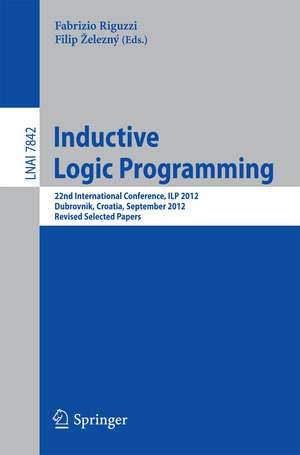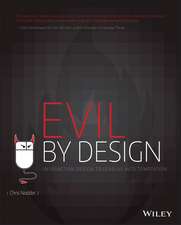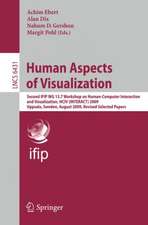Inductive Logic Programming: 22nd International Conference, ILP 2012, Dubrovnik, Croatia, September 16-18,2012, Revised Selected papers: Lecture Notes in Computer Science, cartea 7842
Editat de Fabrizio Riguzzi, Filip Zeleznyen Limba Engleză Paperback – 6 iun 2013
Din seria Lecture Notes in Computer Science
- 20%
 Preț: 741.34 lei
Preț: 741.34 lei - 20%
 Preț: 340.22 lei
Preț: 340.22 lei - 20%
 Preț: 343.43 lei
Preț: 343.43 lei - 20%
 Preț: 315.18 lei
Preț: 315.18 lei - 20%
 Preț: 327.41 lei
Preț: 327.41 lei - 20%
 Preț: 1031.06 lei
Preț: 1031.06 lei - 20%
 Preț: 438.67 lei
Preț: 438.67 lei - 20%
 Preț: 315.76 lei
Preț: 315.76 lei - 20%
 Preț: 330.61 lei
Preț: 330.61 lei - 20%
 Preț: 148.66 lei
Preț: 148.66 lei - 20%
 Preț: 122.89 lei
Preț: 122.89 lei - 20%
 Preț: 995.03 lei
Preț: 995.03 lei - 20%
 Preț: 562.71 lei
Preț: 562.71 lei - 20%
 Preț: 237.99 lei
Preț: 237.99 lei - 20%
 Preț: 504.57 lei
Preț: 504.57 lei - 20%
 Preț: 332.20 lei
Preț: 332.20 lei - 15%
 Preț: 563.85 lei
Preț: 563.85 lei - 20%
 Preț: 636.26 lei
Preț: 636.26 lei - 5%
 Preț: 365.59 lei
Preț: 365.59 lei - 20%
 Preț: 321.95 lei
Preț: 321.95 lei - 20%
 Preț: 310.26 lei
Preț: 310.26 lei - 20%
 Preț: 607.38 lei
Preț: 607.38 lei -
 Preț: 370.38 lei
Preț: 370.38 lei - 20%
 Preț: 172.68 lei
Preț: 172.68 lei - 20%
 Preț: 315.76 lei
Preț: 315.76 lei - 20%
 Preț: 662.78 lei
Preț: 662.78 lei - 20%
 Preț: 256.26 lei
Preț: 256.26 lei - 20%
 Preț: 440.36 lei
Preț: 440.36 lei - 20%
 Preț: 626.79 lei
Preț: 626.79 lei - 20%
 Preț: 566.70 lei
Preț: 566.70 lei - 17%
 Preț: 360.19 lei
Preț: 360.19 lei - 20%
 Preț: 309.90 lei
Preț: 309.90 lei - 20%
 Preț: 579.38 lei
Preț: 579.38 lei - 20%
 Preț: 301.94 lei
Preț: 301.94 lei - 20%
 Preț: 307.71 lei
Preț: 307.71 lei - 20%
 Preț: 369.12 lei
Preț: 369.12 lei - 20%
 Preț: 330.61 lei
Preț: 330.61 lei - 20%
 Preț: 1044.38 lei
Preț: 1044.38 lei - 20%
 Preț: 574.58 lei
Preț: 574.58 lei -
 Preț: 399.17 lei
Preț: 399.17 lei - 20%
 Preț: 802.24 lei
Preț: 802.24 lei - 20%
 Preț: 569.11 lei
Preț: 569.11 lei - 20%
 Preț: 1374.12 lei
Preț: 1374.12 lei - 20%
 Preț: 333.84 lei
Preț: 333.84 lei - 20%
 Preț: 538.29 lei
Preț: 538.29 lei - 20%
 Preț: 326.97 lei
Preț: 326.97 lei
Preț: 294.64 lei
Preț vechi: 368.30 lei
-20% Nou
Puncte Express: 442
Preț estimativ în valută:
56.39€ • 58.78$ • 46.95£
56.39€ • 58.78$ • 46.95£
Carte tipărită la comandă
Livrare economică 06-20 ianuarie 25
Preluare comenzi: 021 569.72.76
Specificații
ISBN-13: 9783642388118
ISBN-10: 3642388116
Pagini: 284
Ilustrații: X, 273 p. 81 illus.
Dimensiuni: 155 x 235 x 15 mm
Greutate: 0.4 kg
Ediția:2013
Editura: Springer Berlin, Heidelberg
Colecția Springer
Seriile Lecture Notes in Computer Science, Lecture Notes in Artificial Intelligence
Locul publicării:Berlin, Heidelberg, Germany
ISBN-10: 3642388116
Pagini: 284
Ilustrații: X, 273 p. 81 illus.
Dimensiuni: 155 x 235 x 15 mm
Greutate: 0.4 kg
Ediția:2013
Editura: Springer Berlin, Heidelberg
Colecția Springer
Seriile Lecture Notes in Computer Science, Lecture Notes in Artificial Intelligence
Locul publicării:Berlin, Heidelberg, Germany
Public țintă
ResearchCuprins
A Relational Approach to Tool-Use Learning in Robots.- A Refinement Operator for Inducing Threaded-Variable Clauses.- Propositionalisation of Continuous Attributes beyond Simple Aggregation.- Topic Models with Relational Features for Drug Design.- Pairwise Markov Logic.- Evaluating Inference Algorithms for the Prolog Factor Language.- Polynomial Time Pattern Matching Algorithm for Ordered Graph Patterns.- Fast Parameter Learning for Markov Logic Networks Using Bayes Nets.- Bounded Least General Generalization.- Itemset-Based Variable Construction in Multi-relational Supervised Learning.- A Declarative Modeling Language for Concept Learning in Description Logics.- Identifying Driver’s Cognitive Load Using Inductive Logic Programming.- Opening Doors: An Initial SRL Approach.- Probing the Space of Optimal Markov Logic Networks for Sequence Labeling.- What Kinds of Relational Features Are Useful for Statistical Learning?.- Learning Dishonesty.- Heuristic Inverse Subsumption in Full-Clausal Theories.- Learning Unordered Tree Contraction Patterns in Polynomial TimeA Relational Approach to Tool-Use Learning in Robots.- A Refinement Operator for Inducing Threaded-Variable Clauses.- Propositionalisation of Continuous Attributes beyond Simple Aggregation.- Topic Models with Relational Features for Drug Design.- Pairwise Markov Logic.- Evaluating Inference Algorithms for the Prolog Factor Language.- Polynomial Time Pattern Matching Algorithm for Ordered Graph Patterns.- Fast Parameter Learning for Markov Logic Networks Using Bayes Nets.- Bounded Least General Generalization.- Itemset-Based Variable Construction in Multi-relational Supervised Learning.- A Declarative Modeling Language for Concept Learning in Description Logics.- Identifying Driver’s Cognitive Load Using Inductive Logic Programming.- Opening Doors: An Initial SRL Approach.- Probing the Space of Optimal Markov Logic Networks for Sequence Labeling.- What Kinds of Relational Features Are Useful for StatisticalLearning?.-Learning Dishonesty.-Heuristic Inverse Subsumption in Full-Clausal Theories.-Learning Unordered Tree Contraction Patterns in Polynomial Time.
Textul de pe ultima copertă
This book constitutes the thoroughly refereed post-proceedings of the 22nd International Conference on Inductive Logic Programming, ILP 2012, held in Dubrovnik, Croatia, in September 2012.
The 18 revised full papers were carefully reviewed and selected from 41 submissions. The papers cover the following topics: propositionalization, logical foundations, implementations, probabilistic ILP, applications in robotics and biology, grammatical inference, spatial learning and graph-based learning.
The 18 revised full papers were carefully reviewed and selected from 41 submissions. The papers cover the following topics: propositionalization, logical foundations, implementations, probabilistic ILP, applications in robotics and biology, grammatical inference, spatial learning and graph-based learning.
Caracteristici
Fast-track conference proceedings of ILP 2012









